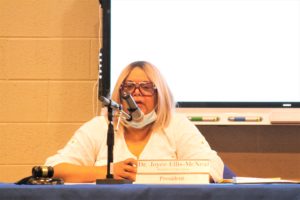By Harold C. Ford
[Editor’s note: For this special “good governance” issue of East Village Magazine, we have invited Education Beat writer Harold C. Ford, who’s been covering the Flint Board of Education for more than five years, to submit not just a factual report about the state of the beleaguered district, but an analysis, with recommendations, from his expertise as a lifelong educator — thus combining two roles — reporter and education expert. Ford has spent most of his life in and around education. He graduated from Kearsley High School, Mott Community College (AA), the University of Michigan-Flint (BA), and the University of Michigan (MA). He was a public educator for 44 years in four different capacities; 43 of those years were spent in the Beecher School District.]
“There’s no greater challenge and there is no greater honor than to be in public service.”
–Condoleezza Rice
“When parents are looking at where to send their kids (to school), there’s an awful lot of faith involved in the sense that, you may not have any money, but you’re investing your kid in a school district. It’s the job of the school district, the challenge of the school district, to be worthy of that faith.”
– Paul Jordan, member, Flint Board of Education, 2005-2009
Based on student enrollment, most Flint parents have not found Flint Community Schools (FCS) worthy of the investment of their youngsters as they have opted to not send their children to its schools. Instead, a substantial majority have chosen charter schools, private schools, home-based schooling, and neighboring school districts via the Schools of Choice option.
FCS student enrollment, not regularly reported to the public, hovers near the 3,000 mark in a district with an estimated 12,000+ school-age youngsters. The exact number was not reported by Superintendent Kevelin Jones – normally a straight shooter with most all the answers – when directly quizzed by Chris Del Morone, assistant secretary/treasurer of the Flint Board of Education (FBOE), at the panel’s June 9 meeting.

(Graphic source: Flint Community Schools)
Each and every student who fails to show at the schoolhouse door of a Flint public school drains the district of $8,000-$9,000 in aid from the State of Michigan. That figure, during these pandemic times with increased state aid, is closer to $9,000. Thus, simple math shows a loss of, say 9,000 students, would mean a whopping commensurate loss of state aid approaching $81,000,000 annually.
Theories about why Flint families have abandoned its public school system might be as plentiful as the number of Flint parents. From this writer’s journalistic perch, the chief cause is FCS instability from top to bottom, beginning with the board of education and central administration reaching down through the hierarchical structure to building administrators, teachers, and support staff.
An accompanying malaise of dispirit punctuated by lack of academic and athletic success in and on deteriorated school buildings and facilities contribute to continuing abandonment of the district.
Flint students’ scores on standardized tests (M-STEP, PSAT, SAT) are among the lowest in Genesee County.

Flint’s Southwestern Academy students fill the hallways between classes. (Photo by Tom Travis)
Glory days for FCS athletic teams are in the rearview mirror. FCS won its last state championship in 1995 – 27 years ago, as detailed in a June 2017 piece in EVM.
In February, Dan Mack, account executive at Johnson Controls, told the FBOE: “The state of disrepair was significant at most of the (FCS) buildings.”
Instability
However, instability that begins with its board of education may be chief reason that FCS is struggling to survive. Even FBOE members, with regularity, publicly recognize their dysfunctional nature:
- “We are at a very fragile state in this district.” –Carol McIntosh, then-FBOE president, Sept. 2021
- “It’s been going on for years and years – hostile work environment, hostile board environment.” –Joyce Ellis-McNeal, president, FBOE, June 2022
The ascension of Kevelin Jones to the FCS superintendent’s office on Nov. 17, 2021 made him Flint’s eighth superintendent in 16 years. And each new superintendent brings with him/her a significant slate of administrative changes at the central and building administrative levels.
Most recently, East Village Magazine reported in a June 10 post that three more members of the FCS central administration team were resigning their positions “due to the hostility, indecisiveness, leadership turnover, and inconsistency of members of the Board of Education.” At the board’s June 15 meeting, it was confirmed that Monaca Elston, the district’s long-time executive assistant, is one of those who would be stepping down.
In recent years, educators have abandoned the district in droves via resignations and retirements taking with them more than a thousand years of experience in Flint schools. In 2019 alone, FCS lost 60 educators with 833 years of experience.

Freeman elementary school in the south end of the Flint Community School District. (Photo by Tom Travis)
Classroom teacher shortages have been so pronounced that “provisional” teachers without full certification have been hired to fill classroom positions while other school personnel, such as teacher aides, have had their contracts restructured allowing them to substitute for absent teachers.
Infrastructure shortcomings – failing HVAC (heating, ventilation, air conditioning) systems, malfunctioning electrical grids, potholed parking lots, deteriorated athletic facilities – frequently appear on FBOE agendas and bog the district down. Eleven FCS buildings average 71-years-old.
As recently as June 15, Mona Monroe-Younis, representing the Environmental Transformation Movement of Flint, told the board of her group’s recent study: “One of the overall findings was that the roofs have needed repairs for so long … The buildings (are) at risk of not being able to be sustainable over time.”
Legal machinations – multiple lawsuits, unsettled issues with two law firms, and legal actions involving two FBOE members – sap the district’s energy and resources. “There’s so much to deal with, lawsuits,” Ellis-McNeal said on June 9. “We’re sidetracked.” About 78 minutes of the 171-minute meeting on that date – 46 percent – was spent on legal matters.
For better board candidates
The uninterrupted arrival of challenges facing public school systems beg for exceptional public servants to meet them. Currently, the requirements to run for a local education board in Michigan are simple and straightforward. A candidate must be: 18 years of age; a U.S. citizen; a Michigan resident for at least 30 days; a resident of the school district 30 days prior to the election; and a registered voter in the school district where s/he is a candidate.

A packed house of 200 plus crammed into the auditorium of Walter Scott School on a hot and sticky July 21, 2021 evening. (Photo by Tom Travis)
But the requirements listed immediately above are woefully inadequate when the well-being of precious schoolchildren is at stake. In terms of pedagogy and economics, the challenge of overseeing modern-day educational institutions has become much more complicated. Here’s a 10-question quiz this Education Beat writer would administer to help determine the readiness of school board candidates:
- Compare/contrast: public schools; public charter schools; private charter schools; private schools.
- Describe Title I and Title IX.
- Describe the Schools of Choice program in Michigan.
- Describe the educational responsibilities of the following: Michigan governor; Michigan Department of Education; Michigan Department of Treasury.
- Describe restorative justice as it applies to the discipline of students.
- Describe the ideas of the following as they relate to education: Thomas Dewey; William Glasser; Abraham Maslow; Geoffrey Canada.
- Describe the following and how they impact schoolchildren: IEP; MASB; GISD; SAT; ACT; UTF; MEA.
- Summarize the controversy surrounding Critical Race Theory.
- At what grade(s) is it OK to teach any sex-ed topic(s)?
- How are public schools funded?
A candidate unable to provide cogent answers to most of the questions above, should step back from his/her candidacy and/or public-school board position.
Beyond the bare requirements are board candidate qualifications as recommended by the Michigan Association of School Boards:
- A willingness “to take the time to study current education issues (see 10 questions above).”
- A willingness “to pursue the skills, the knowledge, and the training necessary to become a fully engaged and effective board member (see 10 questions above).”
- A readiness “to champion an effective public school system to serve our youth despite diminishing resources and increasing demands of the global economy.”
- Preparation “to speak up and serve as an advocate for public education in your community.”
- A willingness “to uphold state laws … put learning first, and give priority to what’s best for children.”
- The ability “to work as a governance team member, putting personal agendas aside and working cooperatively for the best interest of students in your school district.”
“Putting personal agendas aside and working cooperatively for the best interest of students” is arguably the most serious shortcoming of some FBOE members. “Personal agendas” hinder the board’s collective capacity to lead the Flint district forward. For some, haughty arrogance has displaced a spirit of cooperation and clouds what is in “the best interest of (Flint) students.”
Unprecedented challenges
Multiple forces have worked against the success of Flint Community Schools including: the near-abandonment of Flint by General Motors; the more than halving of Flint’s population in the past few decades; an unprecedented water crisis; a worldwide pandemic and resultant learning less.
But some of FCS wounds are primarily self-inflicted: irresponsible management of the district’s budget, bumped by a $20 million dollar loan taken out in 2014; the constant turnover of board members and administrators; the inability to retain and/or hire a sufficient force of highly qualified educators; a decades-long inattention to infrastructure needs; an inability to right size the district and close some school buildings; an apparent unwillingness, thus far, to accept an offer from Flint’s largest foundation to renovate or replace deteriorated buildings.

Durant-Tuuri Mott school on University Ave near Kettering University. (Photo by Tom Travis)
Flint’s budget has been temporarily buoyed by the infusion of $144 million in COVID relief funds that will disappear by 2024. FCS directors of finance and outside auditing firms have warned the district that, without significant changes to the district’s financial portfolio, it will return to the same bleak profile of annual deficit spending and long-term debt.
Parliamentary bumbling
Parliamentary sloppiness frequently sidetracks the FBOE, wasting its time, sapping its energy. The most recent example unfolded at the FBOE’s June 15 regular meeting.
A motion by Del Morone to reconsider a motion passed a week earlier at the board’s June 9 meeting – a motion to provide FBOE Treasurer Laura MacIntyre additional legal support following an alleged assault by another board member – never received a requisite seconding motion as required by both Robert’s Rules of Order and FBOE Bylaws.
Each board member has a copy of FBOE Bylaws tucked in their board binders. Additionally, an electronic copy of “Amended and Restated Bylaws Board of Education of the School District of the City of Flint” is posted at the district’s website.

FBOE meeting from May 2022. (Photo by Tom Travis)
On page 62, under “1350 Voting Method” is found the following language: “No motion may be acted upon until it has been duly seconded by a member of the Board.” Again, Del Morone’s motion never received a seconding motion.
Further, Ellis-McNeal compounded the parliamentary untidiness by declaring Del Morone’s motion to be passed on a 3-2 vote. Another error.
“1350 Voting Method” clearly indicates that four votes on the seven-person panel are required for passage of a motion: “No act of the Board shall be valid unless voted on at a proper meeting of the Board by a majority vote of the members elected to and serving on the Board…”
Nonetheless, FBOE members spent 52 of 97 minutes – fully 60 percent of the board’s meeting time – on Del Morone’s motion. [Interested reeders can witness these parliamentary miscues at YouTube; Del Morone’s motion is introduced at the 35-minute mark; the discussion concludes at 1:27. Print issue can find the link in the online version.]
The FBOE would be well-served to acquire a knowledgeable parliamentarian to help guide them at their meetings.
“Dogged out”
Del Morone’s motion to reconsider additional legal support for MacIntyre unleashed a crossfire of impolite and angry comments so familiar to veteran FBOE-watchers.
MacIntyre’s response to Del Morone’s motion to reconsider: “I may have underestimated the ignorance of my colleagues.

FBOE member Chris Del Morone. (Photo by Tom Travis)
“You don’t want to call other board members ignorant,” snapped Allen Gilbert, trustee, in response.
“Listening comprehension, reading comprehension spells ‘pay attention,’” MacIntyre lectured. “I suggest that you get your facts straight.”

FBOE member Laura MacIntyre (center) (Photo by Tom Travis)
The affair evolved into a shouting match between Ellis-McNeal and Gilbert.
“You’re going to have to respect me!” shouted Ellis-McNeal.

Flint Board of Education President Joyce Ellis-McNeal. (Photo by Tom Travis)
“And you’re going to have to respect me as well!” Gilbert responded.
Ellis-McNeal concluded the unpleasantness with a painful soliloquy of sorts: “Since Joyce Ellis-McNeal got in this seat, it’s been dog, dog, dog … But to be beat down and dogged the way that I’ve been dogged out, I didn’t ask for this seat … We done spending 45 minutes against … the policy … All the elephant in this room is these policy.”
Good news stories
Some FCS good news stories forthcoming in the next Education Beat report include:
- A re-visit to the state’s dismissal of Flint’s Emergency Deficit Elimination Program.
- FCS graduated more than 80 high school seniors in the Class of 2022.
- An analysis of the addenda to the recently-adopted FCS Strategic Plan.
- The move by the FCS administration and board to rid itself of 13 abandoned properties and/or buildings: Cook; Dort; Garfield; King; Johnson; Lowell; Manley; Merrill; Stewart; Washington; Williams; Wilkins; and Zimmerman.
- A report by Diona Clingman, FCS executive director of academics, of some modest assessment gains made by FCS students.
* * * * *
The only future meeting of the Flint Board of Education, as posted at its website, is a Human Resources Subcommittee Meeting at 5:30 p.m. at Accelerated Learning Academy, 1602 S. Averill Ave., Flint, MI 48503. Meetings can be attended virtually; check the FCS website for details. Recordings of meetings can be viewed at YouTube.
EVM Education Beat reporter Harold Ford can be reached at hcford1185@gmail.com.


You must be logged in to post a comment.